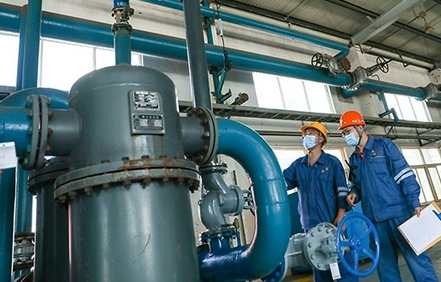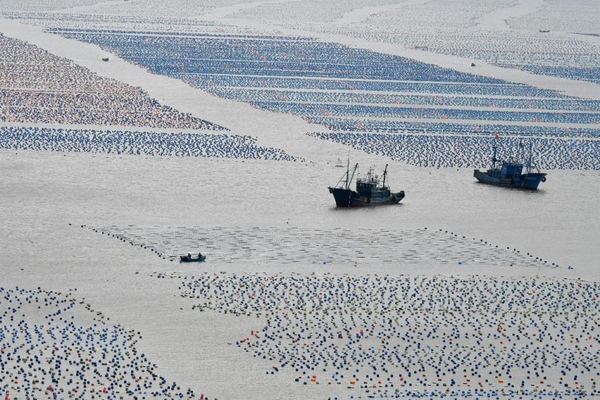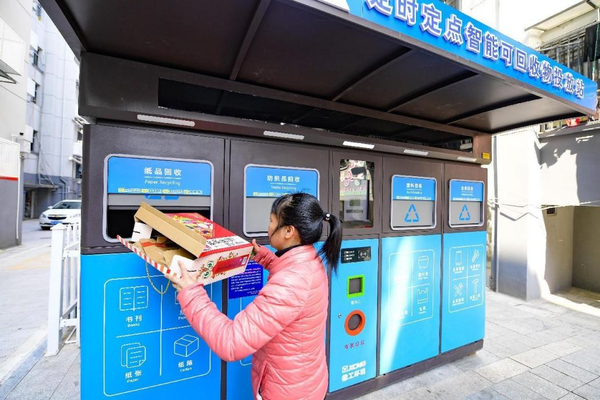By Liu Xiaoyu, People's Daily
In today's China, new special occupations are developing. People engaged in those jobs trade carbon credits instead of sea products in marine aquaculture bases, or recycle waste materials with only one click.
Focusing on the sustainable development of production, life and the ecological environment, such green professions are injecting ceaseless impetus into China's green efforts.
Green professions were identified in China's occupational classification by the Ministry of Human Resources and Social Security in 2015, covering those engaged in environment-friendly, low-carbon and recycling development with high social recognition.
In an updated edition publicized by the ministry last year, the number of green professions reached 134, accounting for around 8 percent of the total.

On a production line of an electromechanical equipment company in Fuzhou, southeast China's Fujian province, waste lithium batteries with hazardous substances were properly dismantled in over an hour, and then recycled to assemble electromechanical equipment.
"Compared with five years ago, the company's carbon emission per 10,000 yuan ($1,448) of output value has dropped 35 percent, and it might keep decreasing," said Tian Yueying, a carbon emission manager who has provided services for the company for six years, expecting more improvement plans.
Carbon emission manager is one of the professions newly added to the occupational classification in 2022. "To make plans that optimize enterprises' production capacity while complying with local environmental standards is a key task of the profession," Tian said.
The company, established in 2004, was mainly engaged in the manufacturing of metal parts and electroplating, both of which cause high energy consumption and pollution.
Based on the company's technical advantages, Tian and her team proposed the idea of lithium battery recycling and launched echelon utilization of the batteries. The company could offset its carbon emissions during production with the emission reduction generated by recycling waste lithium batteries.

"This has not only expanded our income, but also gained us higher emission quotas," said Li Junbiao, head of the company.
In a demonstration base of abalone breeding in Lianjiang county, Fujian province, Huang Qiming from the county's trading and service center for public resources was "selling" carbon sink.
According to the man, the sea can absorb 1/3 of the carbon emissions from human activities each year and fix the carbon by aquatic products such as kelp and abalone. Lianjiang county ranks second in China in terms of aquatic product output, thus boasting rich carbon sink reserves, he said.
Huang became a carbon sink trader last September when Linjiang set up China's first county-level marine carbon sink trading platform. His job is to help match sellers and buyers of carbon sinks, explain to them relevant policies and register trade information.
Qiu Bixiang, general manager of a food company in Fujian province, told People's Daily that under Huang's assistance, the company completed seven deals of carbon sink trade, from which it earned nearly a million yuan.
According to statistics, the annual carbon sink from Lianjiang's mariculture stands at around 400,000 tons, which can generate an economic value of 960 million yuan($138 million).
"Carbon sink traders shall bring to people the dividends of green development," Huang said.

"Residents can find me on the platform by scanning this code," said Zhang Ruiyan, 57, who sorts and recycles resources for a living, pointing to a QR code on a blue box carrying recycled materials in a residential complex in Xiamen, Fujian province.
According to him, selling recycled materials is now as simple as calling an express delivery service. Residents only need to fill in relevant information on a mobile app and place orders.
Zhang has a temporary warehouse as big as a garage, where he stores recycled materials. "This is what I collected yesterday. I can collect about 1,000 kilograms per day. Today, these materials will be shipped to a plant and be made into daily necessities again," he told People's Daily.
Xiamen has achieved full coverage of garbage sorting now, with 97 percent of participation among citizens. Over 43 percent of garbage generated in the city is recycled.
"The business of recycled material management enjoys big potential. We'll enhance industry guidance and encourage more enterprises and individuals to actively participate," said an official with the office of domestic garbage sorting in Xiamen.


